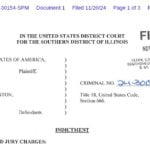Shelby Co. (ECWd) –
In the first article on Michael Willliams’ criminal case, we explained the history of his case and provided the reasoning as to why he was not prosecuted at the state level after his federal conviction as was told to us by those making that decision.
We have now been accused of “arguing” that Mr. Williams charges were dismissed because of the 5th Amendment’s “Double Jeopardy” clause. We made no such arguement. We simply reported that it was dismissed based on the 5th Amendment Double Jeopardy clause as was expressed by the very attorney who filed the motion. Reporting such facts is not arguing a point of law.
The following allegations have now been made regarding this case.
“Illinois is a sovereign state and can decide, despite what has been decided in federal court in a criminal case, to prosecute or not prosecute someone without violating the 5th Amendment. Dual Sovereignty trumps Double Jeopardy. The SA’s office would have been on sound footing prosecuting Mr. Williams had they so chosen, but, like we originally said, they chose not to prosecute.”
“We have included in the comments articles on case law, namely Bartkus v. Illinois 359 US 121 (1959), that support this position. It seems that “the rest of the story” from the ECWD left out quite a bit of detail. We have to wonder if the SA had been the previous two women to hold that position and not the personal lawyer of the ECWD, would their approach have been the same?”
The author of the above statements is not known to us for sure but that makes no difference for the sake of sharing information on this matter. The author states as fact, “Dual Sovereignty trumps Double Jeopardy.” If the author is not an attorney, we can understand why they may believe such a statement after reading opinion pieces on the subject that he linked to in his comments, or at least reading enough to draw the conclusions desired. If they are an attorney, wow is all we can say.
The fact of the matter is the statement is false for more reasons than we have time for but for the sake of education, this quote below is from the very opinion piece the author points to.
“The principle of dual sovereignty does not expressly appear in the United States Constitution, any state constitution or in Black’s Law Dictionary. Rather, the dual sovereignty doctrine is a creation of judicial crafting. In 1852, the principle of dual sovereignty was first articulated in dicta in Moore v. Illinois.” (source document)
With the above paragraph in mind, it appears the author of the “trumps the Constitution” statement would have us believe that a creation of judicial crafting, dual sovereignty, trumps our US and State constitutions. Dual sovereignty is a doctrine. Doctrines do not trump our US and State constitutions. Don’t take our word for that, simply ask any first-year law student.
The author claims the SA’s office would have been on sound footing prosecuting Williams. This begs the question, is this the opinion of an attorney? If it is, the bigger question is why didn’t the SA’s office bring such charges back in 2018 when the crime was committed. If this doctrine has such power to trump our Constitution as claimed, why did the former SA not bring charges for almost three years? Why did the prior SA’s office only file charges after the person was released from his Federal Conviction? While we do not know the answer to those questions, the appearance points to a willingness to follow a doctrine rather than the Constitution for which they took an oath. Was the desire to prosecute possibly out of disgust over the fact the Federal Judge provided an early release? If this attempt to prosecute was based on either the dual sovereignty doctrine or because of an early release, neither should be the grounds to take another bite at the apple they chose to ignore for almost three years.
Before diving into federal cases on the subject, we wonder if the person reviewed our state laws before claiming the SA office would be on solid footing prosecuting Williams in state court for the same conduct he was convicted of in the US District Court.
Is it possible that Illinois state law on this point was solid footing for not prosecuting, which appears to have direct ties to common language related to Double Jeopardy?
According to Illinois law 720 ICLS 5/3-4(c), such a prosecution would appear to violate our own state law.
(720 ILCS 5/3-4) (from Ch. 38, par. 3-4)
Sec. 3-4. Effect of former prosecution.
(c) A prosecution is barred if the defendant was formerly prosecuted in a District Court of the United States or in a sister state for an offense that is within the concurrent jurisdiction of this State, if that former prosecution:
(1) resulted in either a conviction or an acquittal, and the subsequent prosecution is for the same conduct unless each prosecution requires proof of a fact not required in the other prosecution, or the offense was not consummated when the former trial began;
Williams was prosecuted in a District Court of the United States for an offense that is within the concurrent jurisdiction of this state. That prosecution resulted in a conviction and it appears any subsequent prosecution would be for the same conduct as the disposition pointed to the very same conduct that lead to his arrest in the first place. We do know there were other legal considerations that went into the decision on the Williams case.
There is a continued article on this subject matter to be posted shortly after this one. We encourage everyone to read that as well.








No Comments
Sorry, the comment form is closed at this time.